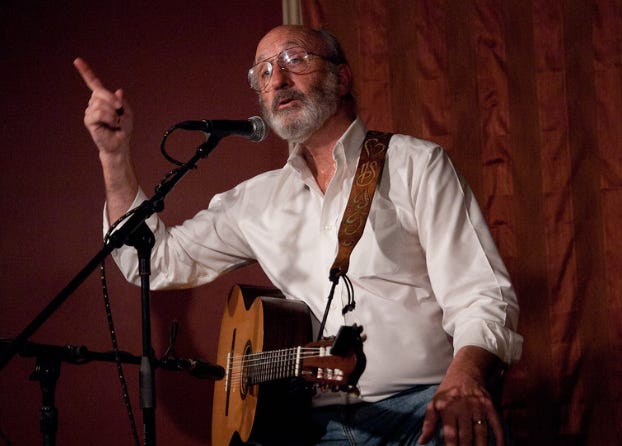And then the world shifted. Well, moved a little bit right, for sure. Between recent Supreme Court decisions, a revealing presidential debate, an assassination attempt— all within the context of the disturbing rise of Christian Nationalism—both Jeanne and I have felt the need over these past several weeks to comment on the times in which we’re living, as much as to reflect upon times past. But then, perhaps that’s not such a reach after all.
Whether called “For the Love of it All” or “There Is Love” (its two working titles thus far), our book is clearly about an evolution of faith—both a personal and public revealing of it. As Jeanne has put it in a recent proposal letter to a publisher, our book is “... a window into the heart and mind of an eighty-six-year-old internationally known singer/songwriter who continues to grow intellectually, spiritually, and musically; to work for social change; and to keep Love at the center of his being and his relationships.”
“But enough about me,” I used to joke embarrassedly. “Let’s talk about my music!”
Most of the songs I’ve written over these past 60 years—both as part of Peter, Paul and Mary and as a solo performer—will never qualify as folk music. Truth be told, I think perhaps “The Wedding Song” (for which I’ve declined authorship in deference to its Source) would come the closest to a piece of music associated with me that might live on long after I’ve passed.
When Jeanne proposed this book, one of the main questions on her mind was how I had integrated my spiritual awakening in the early 70s with PP&M’s advocacy of justice. A platform of acceptance, created by the surprising success and timing of Peter, Paul and Mary’s arrival on the pop music scene with such an eclectic folk repertoire, provided opportunities for our trio to go where few musical groups had gone before. Romantic ballads. some of them a century old; children’s songs.drawn from both folk tales and contemporary imaginings (like “Puff the Magic Dragon”); gospel songs from Black heritage; and anthems of social conscience received unusually wide exposure by virtue of the trio’s growing radio and television audience. I’ve been continually encouraged by this history to address a wide range of topics.
Certainly some traditional folk songs are about love lost and found, but many are commenting on the quest for justice. The curious thing about folk music is its capacity to transcend many years to become relevant once again. The old adage that “the more things change, the more they stay the same” is borne out of the fact that contemporary cultural changes are by and large a by-product of long standing (albeit many times slowly realized) problems and solutions.
As the pages of our book have come together and we’ve looked at the catalog of over 200 songs I’ve written, we have often been surprised at how revelatory and pertinent the lyrics are to both a particular time in my life and to our cultural and political life. And yes, though sometimes a message of social concern is in the forefront, many of the themes reflect an ‘aha’ moment of awareness for me.
Spread out over my 60 years of song-writing topics were those written for my high school “Birds of Paradise” R&B band, tunes revealing my first awkward attempts in Greenwich Village to emulate traditional folk ballads, and then finally songs that helped me realize that “pretending” a musical style is less a style than it is personal deceit. Although “El Salvador,” “Give a Damn,” and “In These Times” had lyrics that focused on an immediate problem, songs of mine like “Be Real” were personal testaments—windows on a journey of self-discovery.
So, in answer to the question posed by the title of this Substack, I’m suggesting two possible responses from me: “perhaps!” and/or “you ain’t seen nothin’ yet!” Since I feel I’ve been called for most of my life to comment musically on our human condition, perhaps it would be best if you accept my contributions to these Substacks much like lyrics of an ongoing song.
I think Jeanne and I would like that…
Connections
Read Diana Bulter Bass’s “Why We Must Talk about God and Religion . . . Especially in the Church.” And hear her interview with Jim Wallis about his new book. .
Vibrations
See Noel’s appearance on “Songwriters in the Round” singing “Be Real” with Julie Dougherty.
Hear PP&M’s version of the Bill Staine song “All God’s Critters,”
Resonance
Can you name three of what you consider to be important elements of any relationship? Of those three, which is the most important to you? How does that choice impact your political life?






Trust—based on intention to be truthful (we don’t always know exactly what the truth is!)
Presence—showing up as best one can (again, sometimes it’s just not possible)
Forgiving—based in love, compassion, respect
Most important: forgiving—grudges kill relationships
Note, I saw you (PPM) at SIU-Carbondale probably 1964. 🥰
Don’t hold back, Noel. We need all of the sane opinions we can get.